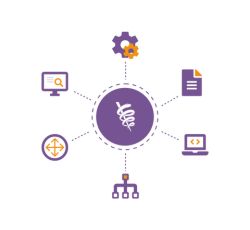Due Diligence Services
Due diligence services refer to a set of investigative procedures and assessments conducted by professionals, typically in accounting, finance, law, or consulting fields, to evaluate a business, investment opportunity, or transaction. These services aim to provide a comprehensive understanding of the risks, opportunities, and potential value associated with the subject under review.
Due Diligence Services provide a systematic and thorough examination of various aspects of a business or investment opportunity, including financial records, operational procedures, legal obligations, and market positioning. By conducting due diligence, organizations mitigate risks by uncovering potential issues or discrepancies that could impact the transaction or partnership. This process not only ensures transparency and compliance but also facilitates informed negotiations and helps in structuring deals that are aligned with the long-term goals and financial health of the parties involved.
At Meru Accounting, our due diligence services are precisely crafted to empower organizations with comprehensive insights and assessments. Whether navigating mergers, acquisitions, or strategic partnerships, we offer a precise examination of financial records, operational efficiencies, and regulatory compliance.
Objectives of due Diligence Services Include:
- Risk Identification: Identifying potential risks and liabilities that could impact the transaction or investment.
- Verification: Confirming the accuracy and validity of information provided by the target entity.
- Opportunity Assessment: Assessing the potential opportunities and synergies that the transaction or investment may offer.
- Compliance: Ensuring compliance with legal and regulatory requirements.
- Decision Support: Providing stakeholders with reliable information to make informed decisions.
Overall, due diligence services are crucial for minimizing uncertainties, maximizing transparency, and facilitating successful business transactions and investments.
Why are Due Diligence Services Beneficial?
Due diligence services offer several significant benefits to parties involved in business transactions, ensuring informed decision-making, risk mitigation, and value optimization. Here are the key benefits:
- Informed Decision-Making:
- Evidence-Based Decisions: Provides stakeholders with detailed insights and data-driven analysis to make informed decisions.
- Enhanced Negotiation Position: Equips buyers or investors with leverage in negotiations by validating the value and identifying potential adjustments.
- Financial Performance Assessment:
- Financial Health: Evaluates the target company's financial statements, cash flow, profitability, and financial health.
- Valuation Confirmation: Confirms the valuation of the target company based on its financial performance and market conditions.
- Strategic Alignment:
- Strategic Fit: Assesses how the transaction aligns with the buyer's or investor's strategic objectives and growth plans.
- Identifying Synergies: Determines potential synergies and opportunities for value creation through the transaction.
- Legal and Compliance Assurance:
- Legal Compliance: Reviews contracts, agreements, regulatory filings, and intellectual property rights to ensure compliance.
- Avoiding Legal Issues: Helps identify potential legal liabilities, litigation risks, or regulatory non-compliance that could affect the transaction.
- Enhanced Post-Transaction Integration:
- Smooth Integration: Facilitates smoother integration of the target company post-acquisition by identifying operational, cultural, and technological integration challenges.
- Realizing Synergies: Maximizes the potential for realizing synergies and operational efficiencies post-transaction.
Due Diligence Services Offer Several Significant Benefits to Parties Involved in Business transactions, ensuring informed decision-making, risk mitigation, and value optimization. Here are the key benefits: Informed Decision-Making: Evidence-Based De
Meru Accounting Due Diligence Services offers several compelling advantages:
-
Comprehensive Analysis: Meru provides a thorough examination of both financial and operational aspects, ensuring that all critical areas are covered. This comprehensive approach minimizes the risk of overlooking significant issues.
-
Expertise and Experience: The team comprises skilled professionals with extensive experience in various industries. Our expertise ensures a nuanced understanding of specific sector challenges and opportunities.
-
Quality of Earnings Assessment: Meru focuses on the quality of earnings, not just the numbers. This involves analyzing revenue sustainability and expense management, which is crucial for understanding true financial health.
-
Tailored Services: Meru accounting tailors its due diligence process to meet the unique needs of each client. This customization enhances relevance and effectiveness in addressing specific concerns.
-
Risk Mitigation: By identifying potential financial, operational, and market risks early on, Meru helps clients make informed decisions, reducing the likelihood of costly surprises post-transaction.
-
Data-Driven Insights: The approach emphasizes data analytics and metrics, providing clients with clear, actionable insights that drive strategic decisions and enhance understanding of the target company.
Due Diligence Services offered by Meru Accounting
Meru Accounting offers a detailed suite of due diligence services tailored to meet the specific needs of clients across various industries and transaction types. Our expertise encompasses:
Financial Due Diligence:
- Thorough analysis of financial statements, cash flows, and key financial metrics.
- Identification of financial risks, opportunities, and insights into historical performance.
Legal Due Diligence:
- Review of contracts, agreements, and legal documentation to assess compliance and potential liabilities.
- Examination of intellectual property rights, litigation history, and regulatory compliance.
Operational Due Diligence:
- Evaluation of management capabilities, organizational structure, and operational efficiency.
- Evaluates technology infrastructure, scalability, and integration readiness.
Commercial Due Diligence:
- Analysis of market dynamics, competitive landscape, and customer relationships.
- Monitor all sales channels including pricing strategies, and market current demands.
Strategic Due Diligence:
- Alignment of the transaction with client’s strategic objectives and growth ambitions.
- Includes managing synergies and market entry opportunities..
Environmental Due Diligence:
- Assessment of environmental impact assessments, regulatory compliance, and potential risks.
- Evaluation of environmental liabilities and mitigation strategies.
Our Approach
The Meru accounting approach to due diligence services emphasizes a holistic understanding of the target company, integrating both quantitative and qualitative analyses:
1. Financial Analysis
- Historical Statements: A thorough review of a company’s financial statements over the past 3-5 years allows analysts to identify trends in revenue, expenses, and profitability. This helps in understanding the financial trajectory and any fluctuations that may indicate potential issues.
- Ratio Analysis: Financial ratios (like current ratio, quick ratio, profit margins) are calculated to benchmark the company’s performance against industry peers. This analysis reveals insights into liquidity, efficiency, profitability, and solvency.
- Cash Flow Analysis: Examining the cash flow statement helps assess the company's ability to generate cash from operations, manage working capital, and fund growth or service debt, ensuring financial stability.
2. Quality of Earnings
- Revenue Recognition: This involves assessing how the company recognizes revenue to ensure it aligns with accounting standards. Understanding the timing and basis of revenue recognition is crucial for assessing earnings quality.
- Expense Analysis: Analysts distinguish between recurring and non-recurring expenses to determine the true operating costs. This helps in evaluating the sustainability of earnings.
- Adjusted EBITDA: Calculating adjusted EBITDA (Earnings Before Interest, Taxes, Depreciation, and Amortization) provides a clearer view of operational performance by removing non-cash items and irregular expenses, allowing for better comparisons across periods.
3. Operational Review
- Process Evaluation: Reviewing operational workflows can reveal inefficiencies and areas for improvement, which could impact profitability and productivity.
- Cost Structure Analysis: Understanding fixed and variable costs helps assess how changes in sales volume affect profitability and enables identification of cost-saving opportunities.
- Revenue Streams: Analyzing the diversity and stability of revenue sources helps assess potential risks. Companies reliant on a few customers or products may face greater vulnerability.
4. Compliance and Controls
- Internal Controls Review: Evaluating the effectiveness of internal controls ensures the accuracy of financial reporting and helps prevent fraud. Strong controls are essential for risk management.
- Audit History: Reviewing past audit reports can highlight significant findings or recurring issues that could affect financial reliability, providing insight into the company’s governance.
- Regulatory Compliance: Ensuring compliance with relevant laws (like GAAP or IFRS) and industry regulations is critical to avoid potential legal and financial penalties.
5. Market and Industry Analysis
- Market Position: Analyzing the company’s position within its industry helps identify competitive advantages, market share, and strategic positioning, which can influence future performance.
- Industry Trends: Identifying trends (like technological advancements or regulatory changes) affecting the industry provides context for potential growth or challenges the company may face.
- Economic Factors: Assessing macroeconomic indicators (e.g., inflation, interest rates) helps understand external factors that could impact the company’s performance and market conditions.
6. Risk Assessment
- Financial Risks: Identifying financial risks such as high leverage or dependency on key customers helps assess the potential for financial distress and informs risk mitigation strategies.
- Operational Risks: Evaluating operational risks related to supply chain reliability, labor issues, or technological failures helps identify vulnerabilities that could disrupt business operations.
- Market Risks: Analyzing competitive pressures and shifts in consumer preferences aids in understanding potential market volatility and threats to revenue stability.
Conclusion
The Due diligence services provided by Meru Accounting are versatile and essential for any organization looking to make informed investment decisions. By offering a comprehensive analysis of financial health, operational efficiency, and market positioning, equips clients with the insights needed to navigate complex transactions confidently.
This not only identifies potential risks but also uncovers valuable opportunities for growth and improvement. In a landscape where informed decision-making is crucial. At Meru accounting we ensure that clients are well-prepared to achieve long-term success and maximize their investments through are due diligence services
Our Bookkeeping And Writeup Process

Your Need
Search the Service You need

Enquiry
For enquiring make a call or mail us

Confirm
Get your Quote and confirm us

Stay Calm
Feel free and Relax Yourself

Effective budgeting and forecasting are crucial elements of strategic financial management, offering a structured pathway to business success.
Read MoreStarting a new business is exciting and it’s full of opportunities and challenges. At Meru Accounting, we understand the complexity involved and we provide comprehensive Business Start-Up ...
Read MoreCost control and reduction strategies are important elements of any organization's financial management structure. In the competitive marketplace, businesses must precisely manage their expe...
Read More
Due diligence services refer to a set of investigative procedures and assessments conducted by professionals, typically in accounting, finance, law, or consulting fields, to evaluate a business,...
Read More
Risk management is a crucial process employed by organizations to identify, assess, and prioritize potential risks that could hinder their objectives.
Read More
Business Process Optimization (BPO) is a strategic approach aimed at enhancing efficiency, reducing costs, and improving overall performance within organizations.
Read More
Financial restructuring is a strategic process that involves reorganizing a company’s financial framework to improve its stability and performance.
Read More
Although launching a business is an exciting endeavour, there are risks and difficulties associated with it. Effective financial management is essential to the success of every start-up, and it ...
Read More
Performance and improvement consulting is pivotal for businesses seeking to optimize operations and achieve sustainable growth.
Read More
Forensic accounting is a specialized area of accounting that involves investigation of financial records to detect fraud, theft, or other financial crimes.
Read More
Software implementation is a vital phase in the lifecycle of any software application. It involves a series of steps designed to ensure that the software is correctly installed and configured to...
Read More
Project accounting is a specialized branch of accounting that focuses on tracking and managing the financial aspects of a specific project throughout its lifecycle.
Read More
In the modern business environment, companies are increasingly recognizing the importance of nurturing not just the professional growth but also the financial well-being of their employees.
Read More
Handling accounts payable is an essential part of managing a business’s finances. It involves tracking and paying invoices, maintaining good vendor relationships, and ensuring cash flow re...
Read More
Medical billing plays a very central role in the healthcare area.
Read More
Patient registration is the first and the most important when a person steps into a hospital, clinic, or any medical facility.
Read More
Insurance verification is among the most integral steps in medical billing. Before providing even a single health service,
Read More
Medical coding refers to the procedure of converting diagnoses, procedures, medical service, and other forms of medical equipment into...
Read More
Claim submission is one of the key processes in health care because this ensures that service providers get remunerated on time.
Read More
Payment posting would be one of the most significant steps in any medical billing cycle so that healthcare providers will get paid for...
Read More
Denial management is one of the important processes in medical billing because it makes sure that the providers of health services...
Read More
Reporting and analytics are crucial parts of medical billing. They will help healthcare providers follow up on the financial performan...
Read More

